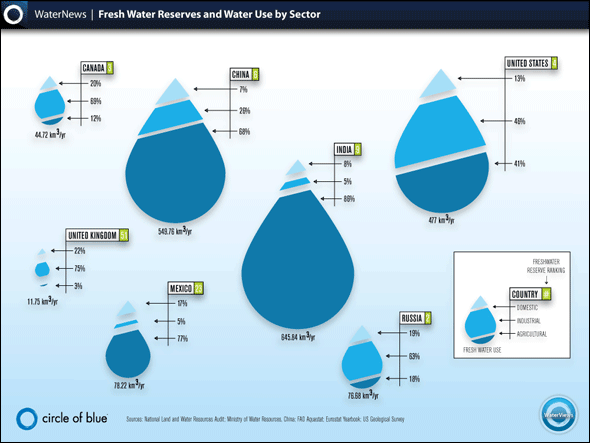Businesses Get New Blueprint for Managing Water Risks
New guide from UN Global Compact’s CEO Water Mandate outlines how corporations can successfully engage in water policy and management.
Businesses around the world will face increasing water-related risks to their operations. That is the conclusion of a newly-released guide by the UN Global Compact’s CEO Water Mandate that aims to help businesses redefine the way they respond to an era of growing water scarcity.
The 110-page Guide to Responsible Business Engagement, which was released Monday at the start of the CEO Water Mandate’s three-day working conference in Cape Town, South Africa, details strategic approaches for companies to turn their water-related risks into opportunities by reconsidering their water policies and management. The report was drafted by the Pacific Institute for Studies in Development, Environment and Society — a nonpartisan research institute based in California.
Businesses face growing threats to the supply, quality and reliability of their water resources — threats they cannot avoid through internal measures alone, said Jason Morrison, director of the Pacific Institute’s Globalization Program and a coauthor of the guide. According to Morrison, increased water security will require government leadership; business can collaborate in that process via policy dialogue and implementation.
“The bottom line is that what is good for communities, for public water management, and for the environment is also in the best interest of companies working to ensure their access to water in the long term,” he said.
The guide references the results of a 2009 global public opinion survey on fresh water sustainability, management and conservation conducted by Circle of Blue and international polling firm GlobeScan. It found that people around the world view fresh water scarcity and water pollution as the planet’s top environmental concerns. More than 90 percent of the survey’s 15,000 respondents identified water pollution and freshwater shortage as serious problems.

“These data represent the views of consumers or clients of corporations from around the world, and are important and motivating perspectives for global companies to consider,” the CEO Water Mandate guide concludes. “Of particular interest is that the same respondents who voice increasing concern about the myriad water challenges also suggest that companies have a clear role and obligation to find solutions.”
While corporate water management has traditionally focused on efficiency improvements and cost-saving technologies, the guide notes that many water risks arise from external factors, including government policies on water allocation, prices, quality standards and pollution controls.
Gavin Power, deputy director of the UN Global Compact and head of the CEO Water Mandate, said solving water problems will require that all stakeholders, including businesses, take part in the decision-making process.
“This new publication gives businesses the practical guidance and tools to engage in a principled way on sustainable water policy,” he said.
The CEO Water Mandate is a three-year-old public-private initiative of the UN Global Compact designed to help companies develop, implement and disclose water sustainability policies and practices.
Sources: United Nations Global Compact, Guide to Responsible Business Engagement with Water Policy (PDF)
Disclosure: Circle of Blue is a non-partisan, non-profit affiliate of the Pacific Institute.











Leave a Reply
Want to join the discussion?Feel free to contribute!